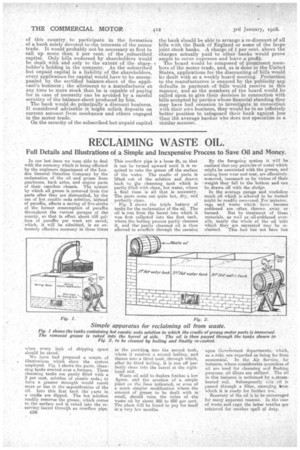RECLAIMING WASTE OIL.
Page 12

If you've noticed an error in this article please click here to report it so we can fix it.
Full Details and Illustrations of a Simple and Inexpensive Process to Save Oil and Money.
In our last-issue we were able to deal with the economy which is being effected by the engineers department of the London General Omnibus Company by the reclamation of the oiland grease from gearboxes, back axles, and engine parts, of their omnibus chassis. The systern by which all grease is removed from thef parts after they are dismantled, by-thd use of hot caustic soda solution, instead of paraffin, effects a saving of five-sixths of the former consumption of paraffin throughout the various garages of the county, so that in effect about (..,60 gallons of paraffin per week are saved, which, it will be admitted, is an extremely effective economy in these times
when every loch of shipping space should be saved.
We have had prepared a couple of illustrations which show the system employed. Fig. 1 shows the parts, cleansing tanks erected over a furnace. These cleansing tanks are partly filled with a 3 per cent, solution of caustic soda; to have a, greater strength would resultmore or less in the saponification of the nil. Into this first tank the Farts in a cradle are dipped. The hot solution readily removes the grease, which come4 to the surface and is raked into the rei ceiving barrel throng-1i an overflow pipe
C36
This overflow pipe is a. loose fit, so that it can be turned upward until it is required to rake the grease off the surface, of the water. The cradle of parts is lifted out of the solution and drawn, back -to the cleansing tank which is partly filled with clean; hot water, where a final rinse is all that is necessary. The parts conic out quite hot, dry, and perfectly clean.
• Fig. 2 shows the triple battery of tanks for the reclamation of the oil. The oil is run from the barrel into which it was first collected into 'the first tank, where the boiling process partly cleanses it, and the' partly cleansed oil is then allowed to overflow through the 'opening
in the partitiotk into the second tank, where it receives a second boiling, and thence into a third tank, , through which, after its third boiling, it is run off perfectly clean into the barrel at the righthand end.
Waste oil sold to 'dealers fetches a low figure, and the erection of a simple plant on the lines indicated, or even of a much simpler modification where the amount of grea.se to be dealt with is small, should raise the value of the Waste oil by about 500 to 600 per cent. The plant will be found to pay for itself in a very few months. By the foregoing sysfem it will ha realized that any particles of metal which might he associated with the grease, and arising from wear and tear, are effectively . removed, inasmuch as by virtue of their weight they fall to the bottom and 'can
be draWn, off with the sludge. • In the average garage and workshop much oil which is allowed to be Wasted Might be readily recovered. For instance, rags and waste which have become saddened are ,ciften• thrown away or
burned. But by treatment of these materials, as well as oil-soddened over• ails, neaxly. the whole of the oil with which they are 'saturated may be re
claimed. This fact has not been lost
upon Government departments, which, as'a_role, are regarded as being far from economical. • In the Air .Service, for iristance, where considerable quantities of oil are used for cleansing and flushing liurposes,: oil filters are utilized. The oil in this instance is reclaimed by a,steamheated coil. Subsequently tuis oil is passed through a filter, emerging from which it is ready for farther. use.
Recovery of the oil is to heencouraged for many .apparent reasons. Ilk the case of waste and rags, the latter textiles are retrieved for another spell of duty.
























